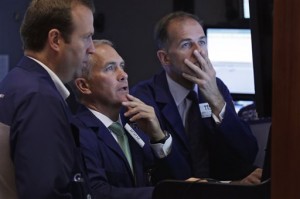US stocks dip as investors eye Greece talks

Timothy Nick, center, works with fellow traders in his booth on the floor of the New York Stock Exchange on Tuesday, June 2, 2015. US stocks finished lower Tuesday in choppy trade, following European equities downward after a senior EU official complained of slow progress in talks to avoid Greek debt default. AP PHOTO/RICHARD DREW
NEW YORK–US stocks finished lower Tuesday in choppy trade, following European equities downward after a senior EU official complained of slow progress in talks to avoid Greek debt default.
The Dow Jones Industrial Average lost 28.43 points (0.16 percent) at 18,011.94.
The broad-based S&P 500 dipped 2.13 (0.10 percent) to 2,109.60, while the tech-rich Nasdaq Composite Index shed 6.40 (0.13 percent) to 5,076.52.
Equity markets in Britain, France and Germany all fell as Eurogroup chief Jeroen Dijsselbloem told Dutch television, “we’re still nowhere far enough” in talks with Greece.
Friday is the deadline for Greece to repay more than 300 million euros ($328 million) to the International Monetary Fund.
Article continues after this advertisementDavid Levy, portfolio manager at Kenjol Capital Management, said investors are also awaiting key economic data later in the week, including Friday’s jobs report for May.
Article continues after this advertisement“Overall we’re in wait-and-see mode,” Levy said.
Apparel company PVH, which owns the Tommy Hillfiger and Calvin Klein brands, jumped 7.1 percent after lifting its 2015 profit forecast from $6.75-6.90 per share to $6.85-$6.95 per share. Strong performance by Calvin Klein offset the hit on overseas earnings from the strong dollar.
Delta Air Lines fell 2.6 percent as it projected a decline of 4-5 percent in consolidated passenger unit revenue, a key industry benchmark, citing lower-than-expected US business class sales.
Oil-services stocks surged as US oil prices finished above $61 a barrel, the highest level all year. Halliburton rose 1.5 percent, Cameron International added 3.4 percent and Diamond Offshore jumped 4.2 percent.
Budget retailer Dollar General advanced 3.0 percent after first-quarter net income rose 13.9 percent to $253.2 million. Same-store sales increased 3.7 percent.
Bond prices fell. The yield on the 10-year US Treasury rose to 2.26 percent from 2.18 percent, while the 30-year advanced to 3.02 percent from 2.94 percent. Bond yields and prices move inversely.